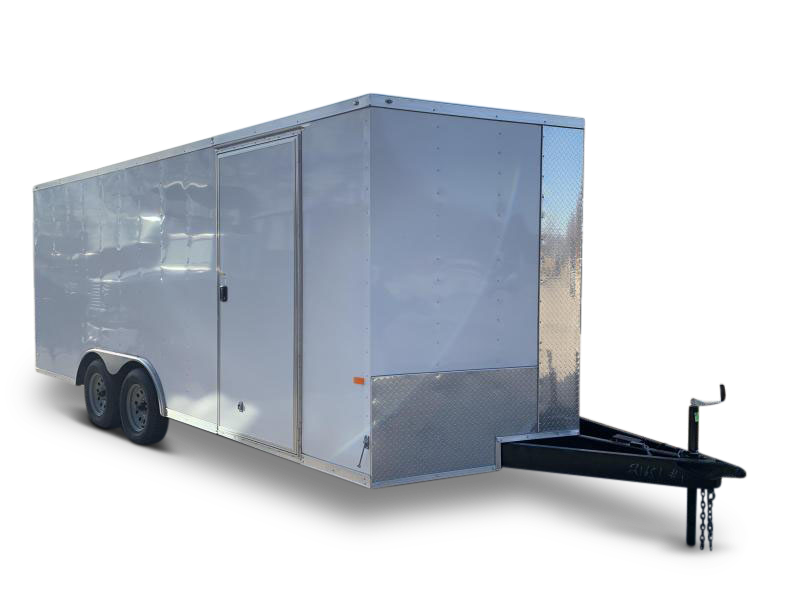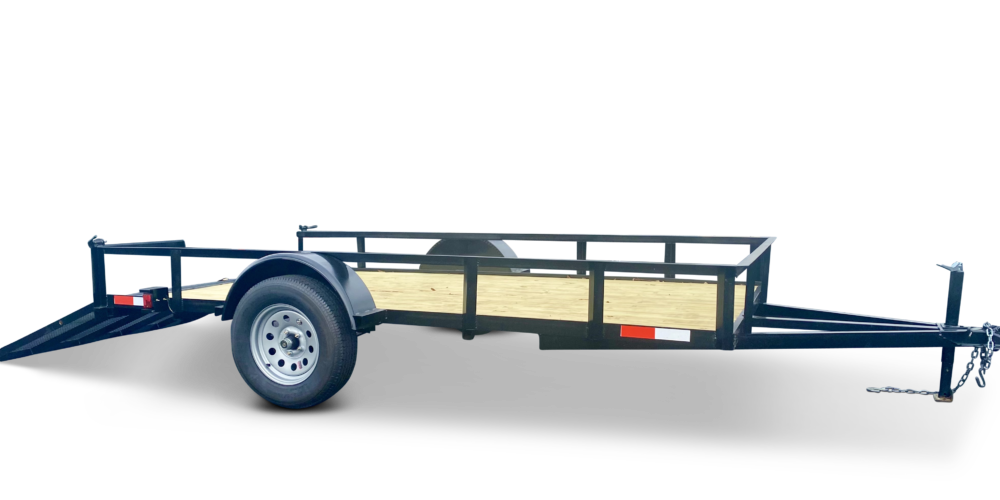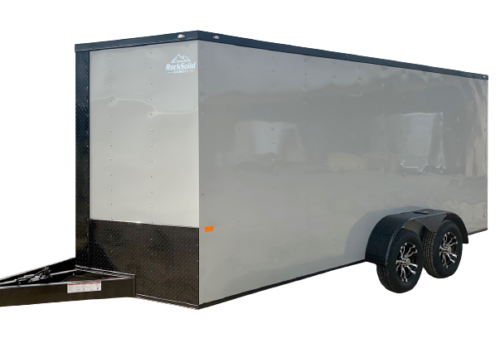Whenever someone is in the market for a new cargo trailer, one of the first questions they usually ask is what size trailer they are going to need for their purposes. Our customers have come to know they can count on Renown for some of the toughest, longest-lasting, and most well-made trailers on the market today, but narrowing down just which size trailer will work can be a little tougher to discern. That’s why we’ve taken the time to provide this ultimate guide for both open and enclosed trailer sizes.
We’ll cover common applications by trailer size and of course, our team is always here to discuss your needs if you want to talk things over with our dedicated trailer pros.
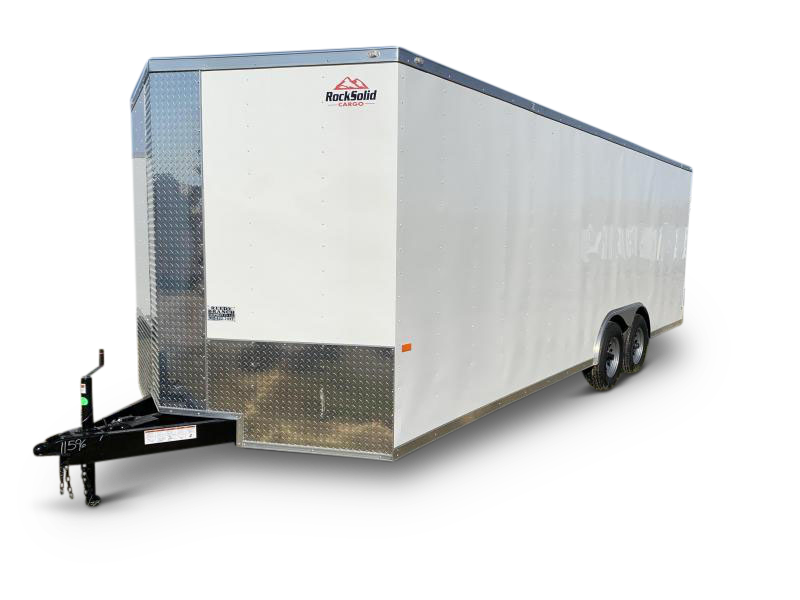
Enclosed Trailer Sizes
The best news with any enclosed trailer is the absolute plethora of options customers have in order to find the right size for their application. To narrow down the scope of different trailers, we can segment enclosed trailer sizes into three different widths – 6’ wide enclosed trailers, 7’ wide enclosed trailers, and 8.5’ enclosed trailers.
- 6’ Wide Enclosed Trailer Sizes – don’t let the smaller size enclosed trailers fool you, these 6’ wide enclosed trailers can handle thousands of pounds of cargo and are ready to roll for personal or business use. 6×12 enclosed trailers are available in both single and tandem axle models, depending on the cargo carrying capacity needs of the customer.
6×12 trailers are fantastic options for smaller landscape operations that may have a single walk-behind mower and a small complement of equipment, handyman who need a mobile tool crib and materials shed, snow cone, and concessions trailers, and a million other applications. Their small size means they are easier to maneuver, back up, and store than a larger size trailer while still being quite capable in terms of payload.
- 7’ Wide Enclosed Trailer Sizes – whether you need a 7×14 or a 7×16, these middle of the pack enclosed trailers meet a lot of different needs simultaneously. You’ll be able to carry more cargo within these larger trailers, while still retaining a lot of maneuverability when your operations have you in some tighter places like urban streets. For one of the baddest, most aggressive trailers out there, you have a great option with the 7×16 tandem axle blackout special.
- 8.5’ Wide Enclosed Trailer Sizes – 8.5’ wide trailers provide the greatest diversity of sizing options within the enclosed trailer lineup. You can get smaller 8.5×14’s all the way up to monstrous 8.5×32 enclosed trailers, with tons of options in between. When you are hauling a prized antique around to different car shows or have a massive amount of gear, the 8.5’ wide options afford the most amount of cargo space available. Our 8.5 foot wide enclosed trailers have been employed in a crazy diverse lineup of different situations. Whether that’s as a dynamo food truck trailer or as a snazzy race car trailer at the track, we can help you get the perfect set up with these very versatile enclosed trailers.
With any of the above, you are going to get a great baseline trailer that actually comes loaded with a lot more options than you would probably expect from a “stock” trailer. There are proprietary Thermacool® roof liners, premium-grade plywood floors, ATP stone guards, Z-Tech undercoatings, 5-year factory warranties, and so much more.
However, the good news gets even better because there are almost endless combinations available when you start looking at your different custom options available. Add a ladder rack to your construction trailer, beef up the ramp door, even increase the interior height of the trailer. Talk to our trailer pro’s about getting every bell and whistle you could ever want or need to be installed on your new dream enclosed trailer.
Open Trailer Sizes
Open trailers are just that, open-air and open skies with nothing between you and your cargo. These offer a very easy way to get your cargo on and off, simply by providing 360 degrees of access. Now, even in the open trailer realm, you have a ton of different open trailer sizes and types to choose from. We’ll narrow it down between two distinct categories – dump trailers and utility trailers.
Sizes and Dimensions for Dump Trailers
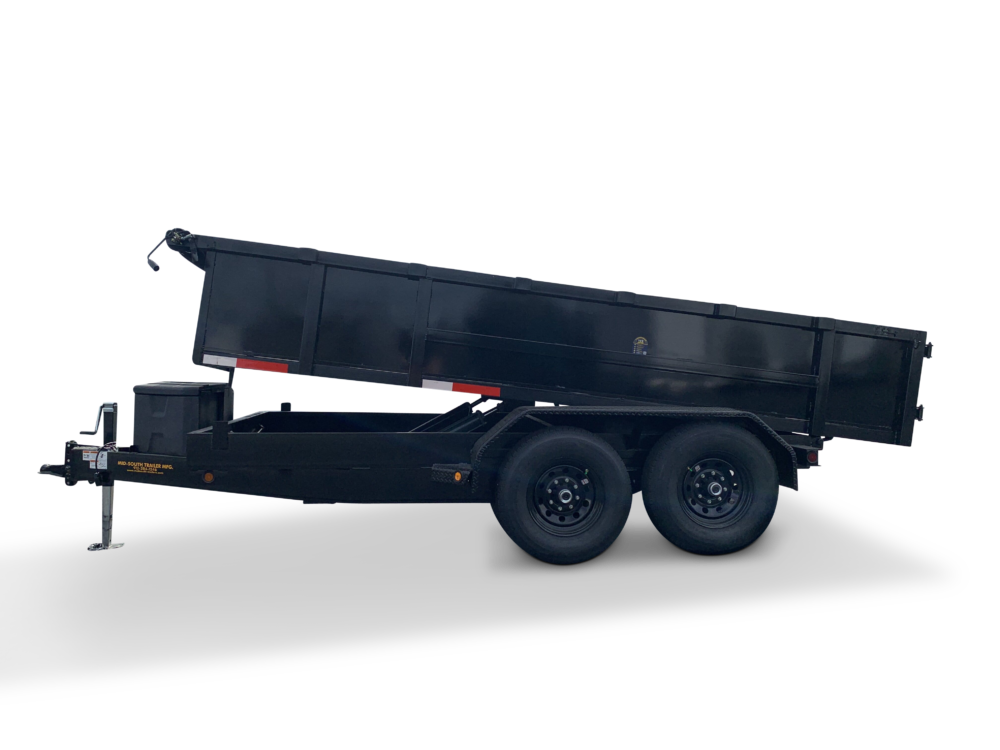
Dump trailers are great for construction and landscaping purposes where you can dump materials quickly and easily wherever they need to go. You have two great options with a 7×16 and a 7×14 dump trailer available. Both of these sizes of dump trailers provide plenty of cargo room for all your equipment while also providing the utility of hydraulic lifts to lift the entire bed of the trailer so all those tree limbs or landscape debris never have to be unloaded by hand again.
Utility Trailer Sizes
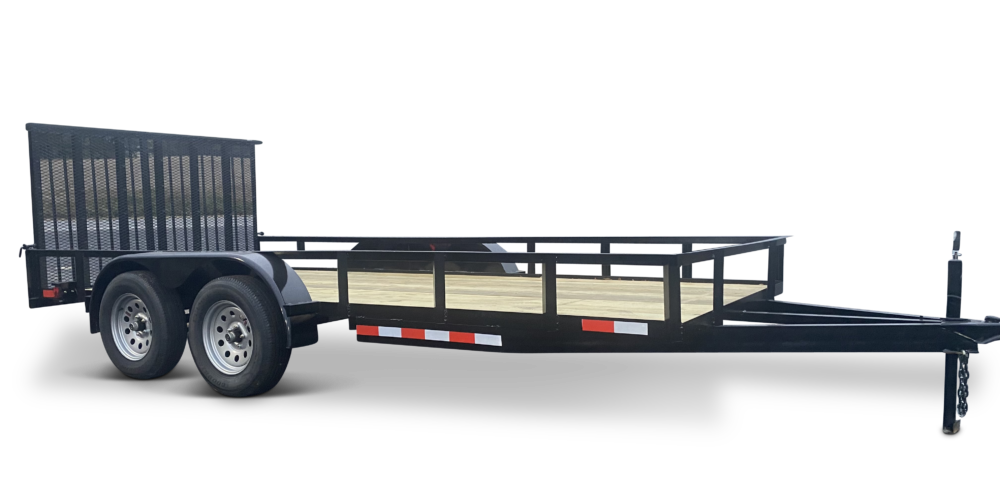
Utility trailers are by far the most popular type of outdoor equipment hauling trailer we carry. That’s because these trailers are built extremely tough to withstand the elements but are no-frills and ready to be put to work immediately. You can get the perfect 6×12 utility trailer, 7×14 utility trailer, or 7×16 utility trailer to best meet your needs.
One of the best parts of a utility trailer is its ease of towing. The relatively lightweight of the trailer itself means you can pull with a wider range of vehicles. So if you’ve got a landscape company with a zero-turn mower and need equipment racks for weed wackers, edgers, and blowers, these trailers are super easy to outfit and get right to work. With easy-to-use top wind set back jacks, you can hitch and unhitch a utility trailer really easily. For all of these reasons, the utility trailer truly offers some of the best utility of any trailer out there.
Jumbo-Sized Enclosed Trailers for the Largest Cargo
It’s pretty well known that we offer a tremendous level of the most popular enclosed trailers, dump trailers, and utility trailers out there. But sometimes even the biggest 8.5’ enclosed trailer options just don’t cut what our customers need to haul really heavy cargo. That’s when absolute monsters in our Gooseneck trailer line-up come into the picture.
Renown’s Gooseneck trailers are available in sizes from 8.5×22 all the way up to 8.5×52! Goosenecks also come in both tandem axle and triple axle options. With the beefiest of the beefy payload capacities around, Goosenecks are your ideal choice when you need to haul really heavy loads over greater distances, offering greater stability by way of couplers installed directly in the tow vehicle’s bed.
Can You Change Sizes of Enclosed Trailers?
As we’ve hinted at, the sky really is the limit when it comes to all of the customization options you have for your new trailer and size really is no different. You can, in fact, change the size of your enclosed trailer simply by choosing from the different heights available. The standard height of an enclosed trailer is approximately 6’ 3” but you can get 6’ 6”, 7’, 7’ 6”, and even 8’ tall interiors added to the height of your new trailer. If you’ve got tall, bulky, hard to maneuver gear, or just really appreciate a lot of headroom, adding height is a great way to expand the space within your trailer and is an easy add-on in the order process.
There are other ways to add additional cargo capacity without changing the size of the trailer, however. If you choose to upgrade the axle, you can really ramp up the payload capacity in short order to haul heavier loads. There are also options like ladder racks which help you make greater use of the exterior of the trailer for tools and equipment. All of these customizations are things that our trailer pros can cover with you in more detail when we meet to discuss your needs. In the end, you can have an enclosed trailer, dump trailer, or utility trailer that’s the right size, with the right equipment to perfectly mary up with everything you need from it.
Getting the Perfect Trailer to Meet Your Needs, Period.
One of the hallmarks of Renown is that we are absolutely not into pushy sales. When you come in, we will take the time to get to know you and the wants and needs of your new trailer before recommending a single product. While it’s pretty rare with our huge selection of top-notch trailers, if we don’t have what you need, we will gladly send you to another dealership that can best suit what you have in mind. That’s the Renown difference.
We treat every customer like a long-time friend and guarantee you’ll get our very best before, during, and especially after the sale. You can count on us to be there no matter what. Give us a try and come see why so many come in as customers and leave as friends. Contact our team and get a quote for your new enclosed trailer.

